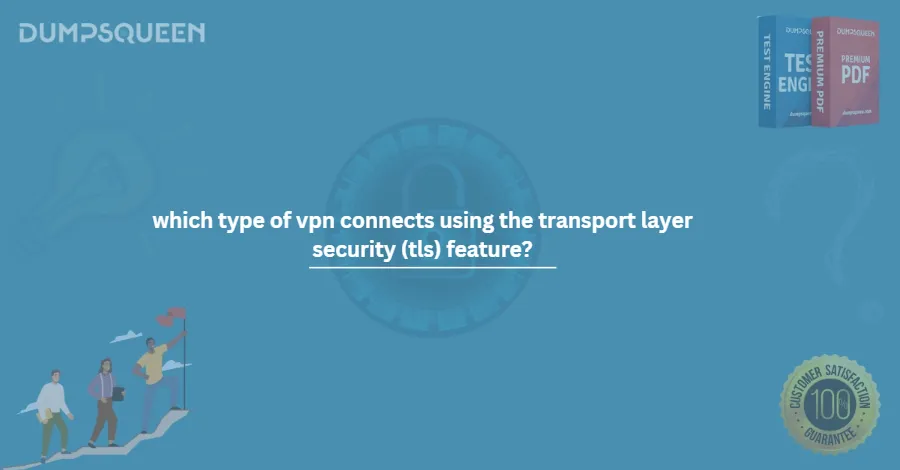Understanding VPNs and TLS: A Key to Cisco 300-430 Success with DumpsQueen
In today’s interconnected digital landscape, secure communication is not just a feature—it's a necessity. Virtual Private Networks (VPNs) have become the backbone of safe data transmission, especially across public networks. For networking professionals preparing for the Cisco 300-430 ENWLSI (Implementing Cisco Enterprise Wireless Networks) exam, mastering VPN technologies, particularly those using Transport Layer Security (TLS), is crucial.
In this detailed guide, we’ll break down VPNs, explore different types, highlight how TLS enhances VPN security, and explain the relevance of these topics to the Cisco 300-430 exam. Throughout this article, we'll also show how DumpsQueen is your ultimate ally in acing this certification by offering expertly crafted exam dumps, real-time exam simulations, and reliable study resources.
VPNs: A Gateway to Secure Communication
A Virtual Private Network (VPN) is a technology that creates a secure and encrypted connection over a less secure network, typically the internet. VPNs allow users to transmit sensitive data as if their devices were directly connected to a private network.
Imagine employees working remotely and accessing the company’s internal systems from different geographical locations. A VPN acts like a tunnel, safely carrying their data back and forth, shielding it from prying eyes.
Role of VPNs in Modern Networking
Data Privacy: VPNs encrypt the data being transmitted, making it unreadable to hackers or unauthorized users.
Remote Access: They enable employees and partners to securely access corporate resources from anywhere.
Bypass Geo-Restrictions: VPNs help bypass content blocks and censorship by masking IP addresses.
Network Segmentation: VPNs ensure sensitive parts of the network are accessed only by authorized users.
With the rise of remote work and global operations, understanding how VPNs function has become more important than ever—especially for those taking the Cisco 300-430 exam.
Overview of VPN Types
VPNs are not one-size-fits-all. Depending on the architecture, encryption protocol, and purpose, VPNs come in various types. Knowing these types helps you make informed decisions in network design and implementation.
1. Site-to-Site VPN
- Connects entire networks to each other.
- Typically used between branch offices and headquarters.
- Tunnels are created between network gateways.
2. Remote Access VPN
- Connects individual users to a remote network.
- Commonly used for telecommuting or accessing internal systems from home.
- Requires a VPN client and user authentication.
3. Client-Based VPN
- Installed directly on user devices.
- Enables secure connections to remote networks.
- Includes encryption and access control mechanisms.
4. SSL VPN
- Uses Secure Sockets Layer (SSL) or Transport Layer Security (TLS) protocols.
- Provides secure access via a web browser, eliminating the need for dedicated VPN software.
- Flexible and easy to deploy.
5. IPsec VPN
- Operates at the network layer.
- Offers robust encryption and tunneling protocols.
- Often used for both site-to-site and remote access.
6. MPLS VPN
- Utilizes Multiprotocol Label Switching.
- Common in large-scale service provider networks.
- Offers better performance and traffic engineering.
Among these, TLS-based VPNs (like SSL VPNs) are particularly relevant in today’s cloud-driven environment—and are a hot topic on the Cisco 300-430 exam.
Transport Layer Security (TLS) in VPNs
Transport Layer Security (TLS) is a cryptographic protocol designed to provide secure communication over a computer network. It’s the successor to SSL and is widely adopted in VPNs due to its high level of security and ease of implementation.
Key Features of TLS:
- End-to-End Encryption: Ensures data remains private between the sender and the receiver.
- Authentication: Validates the identity of parties using certificates.
- Data Integrity: Protects data from being tampered with during transmission.
- Forward Secrecy: Enhances security by generating unique session keys.
In the context of VPNs, TLS is typically used in SSL VPNs and AnyConnect VPNs to provide secure access through web browsers or lightweight clients.
VPN Types Using TLS
Several modern VPN implementations rely on TLS to establish and secure their tunnels. Here’s a closer look at the most common ones:
1. SSL VPN (Web-Based and Tunnel Mode)
- Web-Based SSL VPN: Allows users to access applications via a secure browser session.
- Tunnel Mode: Extends access to entire subnets or applications using client software.
2. Cisco AnyConnect Secure Mobility Client
- A versatile remote access VPN solution by Cisco.
- Uses TLS and DTLS (Datagram Transport Layer Security) to establish secure tunnels.
- Provides features like posture assessment, endpoint security, and seamless roaming.
3. OpenVPN
- Open-source VPN solution.
- Uses the OpenSSL library and TLS protocols for encryption.
- Highly customizable and widely used across different platforms.
These TLS-based VPNs are favored for their ease of use, security, and scalability, making them essential knowledge areas for aspiring Cisco-certified professionals.
Relevance to Cisco 300-430 Exam
The Cisco 300-430 ENWLSI exam focuses on implementing advanced wireless network solutions. VPN technologies—particularly TLS-based solutions like Cisco AnyConnect—play a pivotal role in these implementations, especially when providing secure remote access and protecting wireless communications.
Exam Objectives Related to VPNs and TLS:
Secure Connectivity: You’ll need to understand how to configure and troubleshoot secure wireless client access using VPNs.
Cisco AnyConnect: This is specifically covered in the exam, and understanding how it uses TLS is crucial.
Wireless Security Architecture: TLS-based encryption methods are critical for securing wireless communication.
Network Access Control: VPNs are a foundational element in defining who can access what, and how securely.
By mastering VPN technologies, candidates not only pass the exam but also become equipped to deploy real-world wireless solutions that are secure, scalable, and reliable.
Key Points for Exam Preparation
Preparing for the Cisco 300-430 exam requires a targeted approach. Here are the key takeaways and strategies to ensure success, especially with the help of DumpsQueen:
1. Focus on Cisco AnyConnect
- Learn how AnyConnect uses TLS and DTLS.
- Understand deployment options (client-based, browser-based).
- Practice configuring and troubleshooting AnyConnect sessions.
2. Understand TLS and SSL Fundamentals
- Know how TLS works, including its handshake and encryption methods.
- Be able to differentiate between SSL and TLS, and why TLS is preferred.
3. Hands-On Labs
- Practice setting up TLS-based VPNs using Cisco Packet Tracer or GNS3.
- Simulate real-world scenarios like remote employee access using AnyConnect.
4. Use Trusted Study Resources
- DumpsQueen offers accurate and updated Cisco 300-430 dumps.
- Their resources are curated by certified experts and updated regularly based on the latest exam patterns.
- You’ll find practice questions on TLS-based VPNs, AnyConnect configurations, and more.
5. Simulated Exams
- Take full-length mock exams using DumpsQueen’s platform.
- Analyze weak areas and revisit topics like TLS, VPN types, and wireless security.
6. Join Online Communities
- Engage in discussions with fellow aspirants.
- Share insights, doubts, and tips for mastering TLS-based VPNs and wireless implementations.
Why Choose DumpsQueen for Cisco 300-430 Prep?
DumpsQueen stands out as the most trusted platform for Cisco certification aspirants, especially those taking the 300-430 exam. Here’s why:
- Verified and Accurate Dumps: All practice questions are based on real exam patterns.
- Comprehensive Coverage: Topics like VPNs, TLS, Cisco AnyConnect, and wireless security are thoroughly covered.
- Instant Access: Get downloadable PDFs and web-based test engines immediately.
- Real-Time Exam Simulation: Mimics the actual Cisco exam environment for better readiness.
- Affordable Pricing: Premium materials at a price that suits every learner’s budget.
Thousands of successful candidates have used DumpsQueen to accelerate their Cisco certification journey—and now it’s your turn.
Conclusion
As secure communication becomes increasingly vital in the age of wireless networking and remote access, understanding VPNs—especially TLS-based ones—has never been more essential. Whether you’re learning about SSL VPNs, Cisco AnyConnect, or TLS encryption protocols, mastering these concepts is a key part of your success in the Cisco 300-430 ENWLSI exam.
By combining technical understanding with reliable preparation materials from DumpsQueen, you’re not just preparing for an exam—you’re building a career in secure enterprise networking.
Don’t leave your success to chance. Trust DumpsQueen, your partner in professional growth and Cisco certification excellence.
Free Sample Questions
Which type of VPN primarily uses Transport Layer Security (TLS) for establishing secure connections?
a) PPTP VPN
b) L2TP/IPsec VPN
c) SSL VPN
d) OpenVPN
Correct Answer: c) SSL VPN
Which VPN type leverages TLS to provide secure remote access through a web browser?
a) SSTP VPN
b) IKEv2/IPsec VPN
c) SSL VPN
d) WireGuard VPN
Correct Answer: c) SSL VPN
Which of the following VPN technologies relies on TLS for encryption and authentication?
a) SSL VPN
b) PPTP VPN
c) GRE VPN
d) L2TP VPN
Correct Answer: a) SSL VPN
Which VPN type uses TLS to enable secure communication without requiring dedicated client software?
a) OpenVPN
b) SSL VPN
c) IPsec VPN
d) MPLS VPN
Correct Answer: b) SSL VPN
Which VPN protocol is associated with TLS to ensure secure data transmission over HTTPS?
a) SSTP VPN
b) SSL VPN
c) L2TP/IPsec VPN
d) SoftEther VPN
Correct Answer: b) SSL VPN




